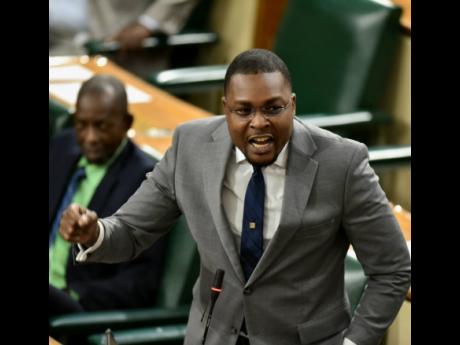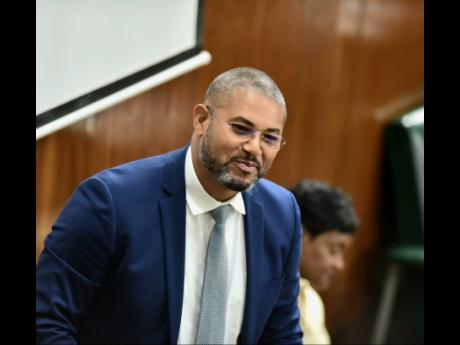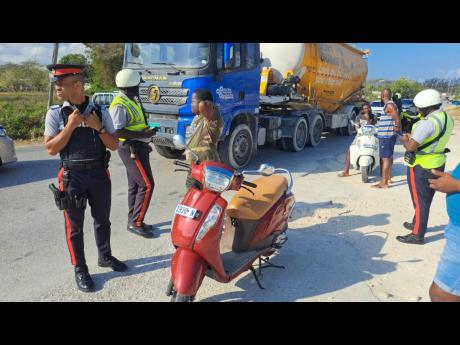Child seat U-turn
Gov’t strikes compromise in traffic law controversy
Reeling from backlash since the February 1 implementation of the Road Traffic Act and Regulations, the Government made several concessions on Tuesday, including scrapping the requirement for children to be restrained in special seats in public passenger vehicles.
There will also be a three-month window for additional amendments to the act.
Taxi drivers railed against the provisions, refusing, in some cases, to transport children for fear of being ticketed.
Following days of discontent, including a patchy withdrawal of cab service in several parishes, Transport Minister Audley Shaw outlined the concessions in a brief statement to the House of Representatives on Tuesday.
He sought to remind the public that the child seat provision had always been a requirement but was not previously enforced.
“In the case of licensed public passenger cars or buses, children under one year old must be restrained by an adult. One to three years old may travel with no restraint or be restrained by an adult. Three to six years old may travel without restraint, restrained by an adult, or seat belt. Six to nine years old may travel without restraint or with a lap belt, and children over nine years may travel without restraint, with a lap belt or a three-point seat belt ... ,” Shaw told colleague lawmakers.
“Only children of the weight and size to use an adult seat belt are permitted to travel in the front passenger seat. In addition, where an adult is restraining a child, the adult should not be in the front. Children under one year old are to be restrained by an adult in all forms of transport.”
All other children must be transported using appropriate restraints based on their size and weight, Shaw said.
Shaw said the Government listened to feedback and acknowledged that the realities of public transportation system placed undue burden on parents whose children travel on buses and taxis, whether accompanied by an adult or not.
Opposition members asked that a number of other issues be considered, such as offering a reprieve for malfunctioning lights on a vehicle on first-time offences, the requirement for all cars being imported to have rear seat belts, and who will determine age when some children are overdeveloped.
Shaw also promised that public education will be stepped up.
Opposition Spokesman on Transport Mikael Phillips welcomed the concessions but chided the Government for failing to launch a public education campaign, which he believes would have cleared up many concerns. Phillips’ comment that the Government sought to ascribe blame to former Transport Minister Dr Omar Davies, who pushed an earlier iteration of the legislation, agitated government members. Robust crosstalk forced Speaker Marisa Dalrymple Philibert to plead ad nauseam for decent conduct in the House. It fell on deaf ears mostly.
Phillips accused the Government of being in a hurry to raise more revenue from fines and described the law as “messy”.
“The contents of this legislation have been in effect since 2015, but it fell off the Order Paper because there was an election in 2016. It took another two years before it came before the House and another three years for the regulations,” Phillips said.
Vice-chair of the National Road Safety Council, Dr Lucien Jones, said he was constrained in his comments on some of the provisions because the body will meet Thursday to review the law.
“A lot of the issues you are raising will be discussed at the meeting. A collective decision will be taken. The most I can say, generally, in respect of the WHO’s recommendations about safe systems, the body of the act will go a far way to ensure that we have safe road users if people adhere to the regulations and safety. That’s the context in which we are viewing the act,” he told The Gleaner.
Prior to Tuesday’s announcement, Raymond Bynes, president of the All Island Route Taxi Association, said many concerns about the act were raised on its platform, including other provisions which have taken a back seat to child-seat requirements in public passenger vehicles.
Hefty fines, the ban on handling cell phones while driving, the tow truck stipulation on toll roads were among hot-button topics discussed.
“What I can say is either we want the changes or we don’t want it. If we don’t want it, then we going to go back to being a last-world country. My organisation is not moving towards demonstrations or lamentations. We are moving toward education,” Bynes told The Gleaner.
“So we are asking the Government to call the umbrella group whenever any changes are going to be made, and then we can discuss with our members. We are asking for dialogue.”



